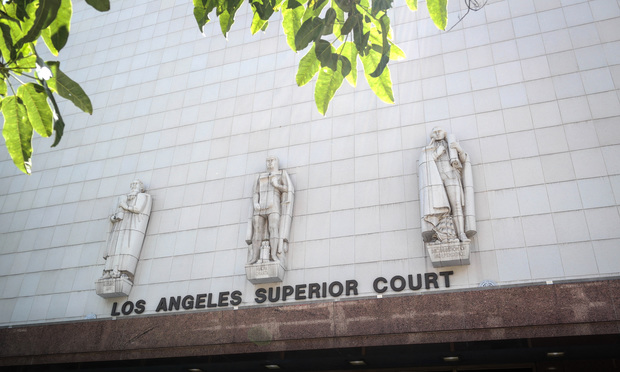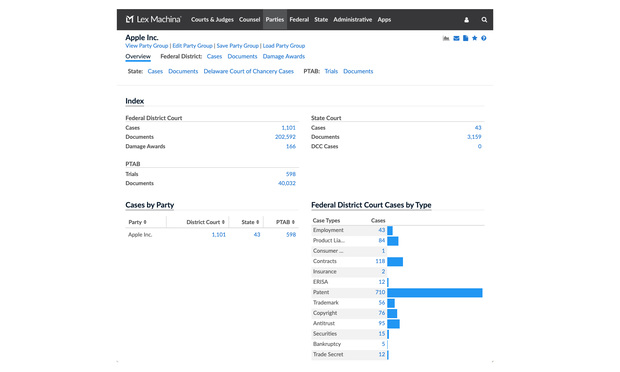Lex Machina's Legal Analytics Expands Into LA Superior Court
Lex Machina's Legal Analytics platform is entering Los Angeles Superior Court and Texas' Harris County District Court and Harris County Court. However, the company doesn't plan to stop there.
February 04, 2020 at 08:00 AM
5 minute read

Lex Machina is expanding the Legal Analytics platform it launched in federal courts to state courts, starting with Los Angeles and Houston.
The litigation and research company has plunged into the data-rich venues of Los Angeles Superior Court and Texas' Harris County District Court and Harris County Court, which encompass Houston.
Carla Rydholm, director of product management for the Menlo Park-based company, said a mix of practicality and customer demand drove Lex Machina's choice to lead off its state court incursion with those two metro areas.
"Los Angeles civil trial court is the largest in the United States in terms of total cases filed," she said. "To us, that was really attractive to take on as a meaningful data set to bring legal analytics to. We also have a strong client base in Los Angeles and got feedback that that's one of the must-have courts."
While Los Angeles Superior Court brings in a large sample size of cases, Rydholm said integrating the Texas courts creates a more diversified data set.
"With our patent background and all the patent litigation going on in Texas, we have a strong customer base, and we know of use cases for Houston County courts as well," she said.
While the tool might help California legal experts get familiar with the hundreds of state court judges, the tool can be particularly beneficial for Texas' elected judgeships.
"In Texas, there might be a brand new judge, a sweep of postelection new faces that you don't know," she said. "It's possible you might not be familiar with a particular judge."
Like its federal product, Lex Machina customers will be able to review the courts' case data by judges, lawyers, law firms and parties.
 Lex Machina's state courts Legal Analytics platform allows users to compare the court data of parties such as Apple Inc. to its competitors.
Lex Machina's state courts Legal Analytics platform allows users to compare the court data of parties such as Apple Inc. to its competitors.For instance, users will be able to see that Los Angeles Superior Court Judge Dalila Corral Lyons has more than 300 cases each year, and that only 15 of her cases since 2016 reached trial. They could also see that the top five law firms representing defendants in her cases are Lewis Brisbois Bisgaard & Smith, The Erskine Law Group, Gordon Rees Scully Mansukhani, Seyfarth Shaw, and Bowman & Brooke. Customers could even take a peek at the average time to trial in Lyon's court, which is 649 days, and the scope of damages for cases she's presided over, ranging from $15,000 to $115 million.
Law experts can also look up companies, such as Apple, to see that the tech behemoth has 1,101 cases in federal court—mostly patent litigation—and 43 in state court, with two cases in Harris County District Court and 41 in Los Angeles Superior Court, as of Thursday.
However, Lex Machina encountered new roadblocks as it started to scrape the 30 million cases in the notoriously cavernous state court system, with Los Angeles Superior and the Harris County courts alone making up 870,000 of those cases.
A big obstacle to overcome is that the federal court's PACER program essentially functions as one platform, while state courts operate their own individual databases. Also, state courts don't always list the judge in dockets, or they only list the attorney's name and not the firm on documents. Some courts won't even allow Lex Machina to send physical copies of documents to users.
"For Pacer, it's more typical that we're supplementing or correcting the court record, whereas for state [courts], we're building data sets," Rydholm said.
State courts' slow uptake of e-filing also means the data often only goes back to 2016, whereas Lex Machina has federal court data for the last decade.
But the challenges that are throwing Lex Machina's algorithm experts into overdrive aren't stopping the company's plans to add new state courts later this year. Rydholm said the company's product road map for the future, built mostly from user input, includes more Texas courts and California cities such as Sacramento, San Bernardino, Riverside and more of the San Francisco Bay Area. However, a future expansion into New York's court systems will likely be the biggest project on Lex Machina's docket.
"New York will be a large volume, as well, so we'll take those learnings and tackle additional courts," she said.
Eventually, the company is hoping to integrate the Delaware Court of Chancery module it launched in 2017 into this new state courts platform. Because Delaware funnels in a significantly different data set as a court of equity, she said, the company is getting feedback on how to seamlessly add it to the new interface.
Rydholm said the environment the product is launching in has changed a lot since she started with the company in 2010, when in-house counsel saw legal tech as a burden.
"Things are really coming together for legal tech," she said. "As courts make more data available, we're seeing user adoption and engagement and people realizing there's more that could be known. Keeping an eye on what is happening with litigation and understanding trends, that's conventional now."
Rydholm said that a lot of the Lex Machina team still believes in the early venture capital pitches about bringing transparency to the law, data-driven lawyering, and that their entry into state courts is just one step in a much broader vision.
"We're all in," she said. "We plan to go big in terms of volume in state courts—and then beyond the United States. That's where we're headed."
This content has been archived. It is available through our partners, LexisNexis® and Bloomberg Law.
To view this content, please continue to their sites.
Not a Lexis Subscriber?
Subscribe Now
Not a Bloomberg Law Subscriber?
Subscribe Now
NOT FOR REPRINT
© 2025 ALM Global, LLC, All Rights Reserved. Request academic re-use from www.copyright.com. All other uses, submit a request to [email protected]. For more information visit Asset & Logo Licensing.
You Might Like
View AllLaw Firms Mentioned
Trending Stories
- 1Three East Coast Midsize Firms Partner to Create Cohen Vaughan
- 2Goodwin, Leaning Into IP Work, Hires 2 Lateral Partners in NY
- 3Weil Lures DOJ Antitrust Lawyer, As Government Lateral Moves Pick Up Before Inauguration Day
- 4Lawyers Share Concerns, Predictions Over How Bondi’s Loyalism to Trump May Impact DOJ
- 5As Bonus Pools Expand, Challenges Grow in Partner Compensation
Who Got The Work
Michael G. Bongiorno, Andrew Scott Dulberg and Elizabeth E. Driscoll from Wilmer Cutler Pickering Hale and Dorr have stepped in to represent Symbotic Inc., an A.I.-enabled technology platform that focuses on increasing supply chain efficiency, and other defendants in a pending shareholder derivative lawsuit. The case, filed Oct. 2 in Massachusetts District Court by the Brown Law Firm on behalf of Stephen Austen, accuses certain officers and directors of misleading investors in regard to Symbotic's potential for margin growth by failing to disclose that the company was not equipped to timely deploy its systems or manage expenses through project delays. The case, assigned to U.S. District Judge Nathaniel M. Gorton, is 1:24-cv-12522, Austen v. Cohen et al.
Who Got The Work
Edmund Polubinski and Marie Killmond of Davis Polk & Wardwell have entered appearances for data platform software development company MongoDB and other defendants in a pending shareholder derivative lawsuit. The action, filed Oct. 7 in New York Southern District Court by the Brown Law Firm, accuses the company's directors and/or officers of falsely expressing confidence in the company’s restructuring of its sales incentive plan and downplaying the severity of decreases in its upfront commitments. The case is 1:24-cv-07594, Roy v. Ittycheria et al.
Who Got The Work
Amy O. Bruchs and Kurt F. Ellison of Michael Best & Friedrich have entered appearances for Epic Systems Corp. in a pending employment discrimination lawsuit. The suit was filed Sept. 7 in Wisconsin Western District Court by Levine Eisberner LLC and Siri & Glimstad on behalf of a project manager who claims that he was wrongfully terminated after applying for a religious exemption to the defendant's COVID-19 vaccine mandate. The case, assigned to U.S. Magistrate Judge Anita Marie Boor, is 3:24-cv-00630, Secker, Nathan v. Epic Systems Corporation.
Who Got The Work
David X. Sullivan, Thomas J. Finn and Gregory A. Hall from McCarter & English have entered appearances for Sunrun Installation Services in a pending civil rights lawsuit. The complaint was filed Sept. 4 in Connecticut District Court by attorney Robert M. Berke on behalf of former employee George Edward Steins, who was arrested and charged with employing an unregistered home improvement salesperson. The complaint alleges that had Sunrun informed the Connecticut Department of Consumer Protection that the plaintiff's employment had ended in 2017 and that he no longer held Sunrun's home improvement contractor license, he would not have been hit with charges, which were dismissed in May 2024. The case, assigned to U.S. District Judge Jeffrey A. Meyer, is 3:24-cv-01423, Steins v. Sunrun, Inc. et al.
Who Got The Work
Greenberg Traurig shareholder Joshua L. Raskin has entered an appearance for boohoo.com UK Ltd. in a pending patent infringement lawsuit. The suit, filed Sept. 3 in Texas Eastern District Court by Rozier Hardt McDonough on behalf of Alto Dynamics, asserts five patents related to an online shopping platform. The case, assigned to U.S. District Judge Rodney Gilstrap, is 2:24-cv-00719, Alto Dynamics, LLC v. boohoo.com UK Limited.
Featured Firms
Law Offices of Gary Martin Hays & Associates, P.C.
(470) 294-1674
Law Offices of Mark E. Salomone
(857) 444-6468
Smith & Hassler
(713) 739-1250






